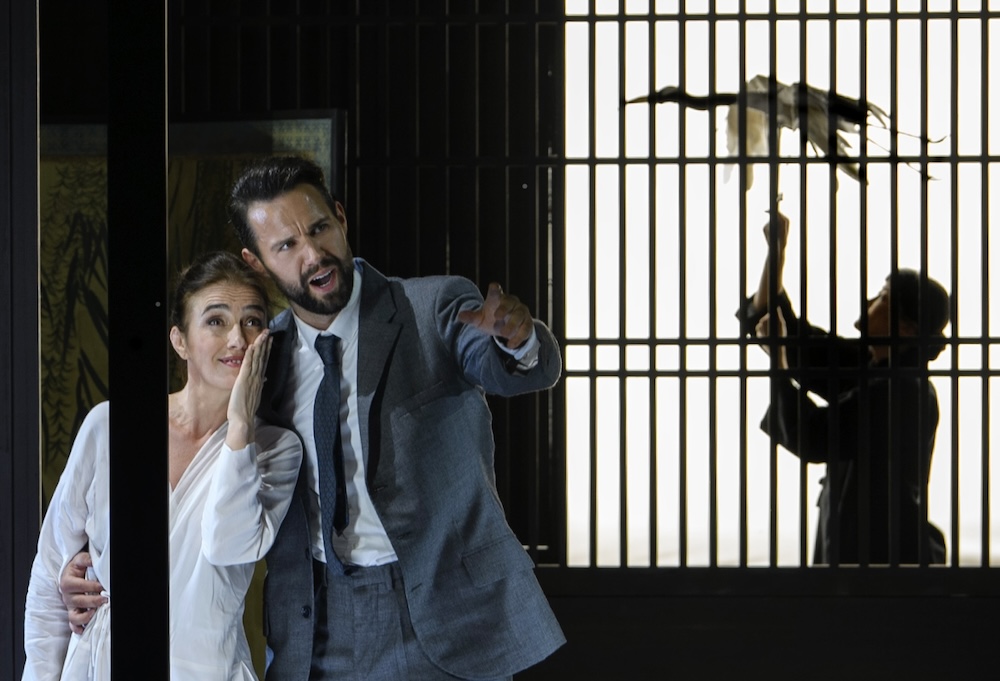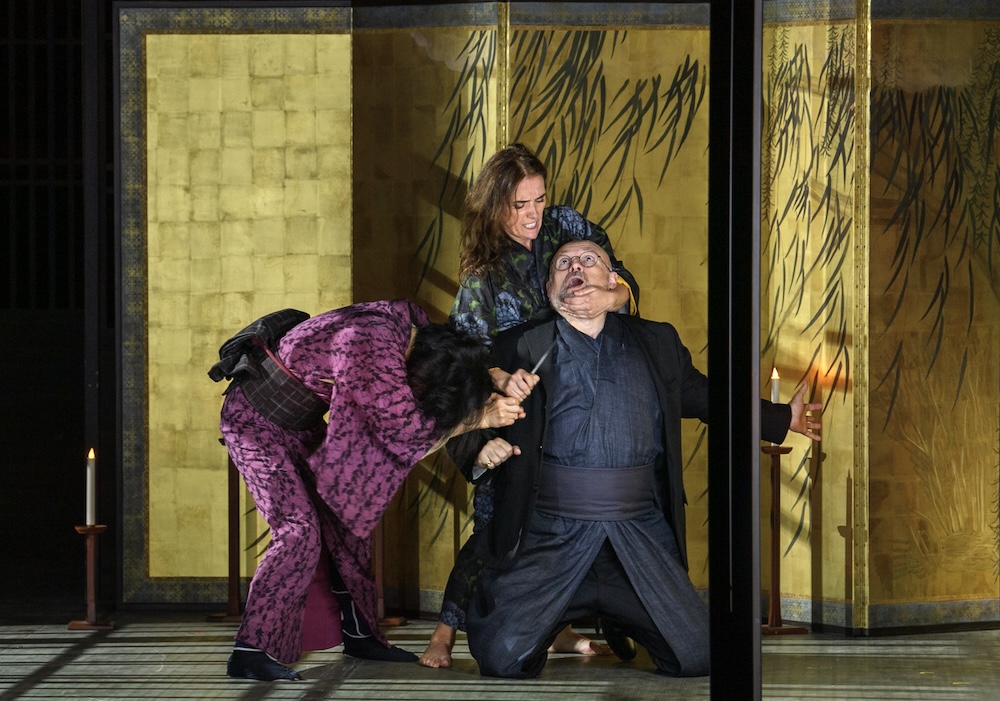Well, why not? Why not place this iconic statement of Italian verismo in the hands of a hyper-teutonic, avant-garde (ish) stage director, adding in a new-age Italian conductor for good measure.
Not to mention a 50 year-old high-artifice diva, a heavy dose of anti-Americanism with a squawking tenor and a cold, sharp voiced baritone. The ancillary personages included an all-knowing Asian mezzo soprano, a motionless Asian bass, and two blatantly non-Asian tenors — an Italian and a Swede.
But there were six, distinctly Asian black clad supernumerary dancer types, one or some of whom stood motionless, Butoh-like, in stage pictures, when not parading with puppet cranes (the Japanese symbol of happiness, we learned from our phones at the intermission).
How did all of this work out? Well, it sort of worked out, given that Puccini’s masterwork may be indestructible.
The key to figuring it out was in the program booklet, where the stage director, Andrea Breth, herself surprised to be offered such an assignment, admits basing the production’s iconography on the arty photographs of two Austrians who had traveled to Japan in the late nineteenth century. Thus the abstracted black and white structure that served as Pinkerton’s Nagasaki minka [house], with its four downstage poles that always prevented some portion of the audience from seeing the face of whoever was singing.
Though stage director Breth insists that she avoids realism, Pinkerton was found reading a newspaper awaiting his bride, Jeffrey Epstein-like. He then took off a shoe, insisting that Suzuki wash his feet, he offered cigarettes and whiskey to Sharpless, and sang “Dovunque al mondo,” his face hidden behind a pole from my seat.
There was a platform that silently floated in from the left, crossing the stage and ending just there, forcing all entrances from the left. Butterfly slowly emerged on the moving platform, in an almost motionless tableau (she was singing), dressed in bridal white. The chorus remained hidden backstage, though a tableau of Butterfly’s relatives peeked out, the Asian supernumerary dancers in Noh theater masks.
Thus stage director Berth established Butterfly’s exotic, magical, poetic world in contrast to the crass, whiskey scented world of the Americans. Pinkerton entered into Butterfly’s world for Puccini’s magical duet “Bimba dagli occhi pieni di malia.” The new lovers remained stationary, hidden downstage in the dark while an upstage panel slowly opened, its white light intensifying as an Asian actor slowly moved the wings of a tsuru [crane] puppet, other actors following into the light, a moving tableau of flying birds.

Mme. Breth’s first act was a heavy handed compendium of images, some tasteless, images she had made little effort to understand and feel, much less integrate such imagery into the verismo of Puccini’s deeply felt score. The following acts were equally troubled, if salvaged by Puccini himself and the committed performances of Butterfly and Suzuki.
It was a great pleasure to know, finally, Albanian soprano Ermonela Jaho’s Butterfly (lead photo), one of her signature roles with which she has gained worldwide fame. Mme. Jaho’s voice no longer has the youthful bloom that Butterfly demands, though she sings beautifully when she allows herself the use of her mature voice. She can embody a believable Butterfly in stature and movement, her expressive face (when not hidden by a pole) easily read from the furthest reaches of a theater. Vocally she is well able to find the support needed to sing softly for extended periods, and finds Butterfly’s interpolated high C# (or maybe it’s a D) with ease. But her voice now has a dryness that rendered her second act rather colorless, though she shone in the last act’s “Tu, tu, piccolo iddio” by unleashing her mature voice.
As well, it was a great pleasure to know, finally, the mezzo-soprano Mihoko Fujimura. That she may be Japanese is irrelevant to her beautifully sung and acted performance as Suzuki. She provided a moral center for the opera for us, and offered us the emotional strength needed to accept the shattering emotions of the opera’s resolution. Mme. Fujimura is 58 years old, of a warmth of voice that exudes maturity and its attendant understanding imbued with an intensity of feeling.
British/Irish tenor Adam Smith as Pinkerton and Belgian baritone Lionel Lhote as Sharpless are excellent singers and able performers. Neither artist has the Italianate sound or beauty of voice that we associate with these roles, and that flow easily with Puccini’s score. In keeping with the casting prerogatives of the Aix Festival — sensitive, indeed subservient to the requirements of a stage director — voices and bearing were found that could bespeak the crassness of Andrea Breth’s Pinkerton and the bureaucratic coldness of her American consul. Both men obliged, fulfilling the needs of the production, exhibiting voices more suited to the central and eastern European repertory. Mr. Smith did have a couple of unfortunate squawks, from which he recovered, giving a remarkably graceful, under the circumstances, performance.

The marriage broker Gore was sung by Italian tenor Carlo Bosi. Normally the role Goro is taken by a character tenor, and given that Goro is Japanese normally he is of a slight build. Mr. Bosi is a large man with a full voice. There was no attempt to make us believe he was other than a business-like, effective marriage broker, a functionary of the crass American world. Prince Yamadori was sung by Swedish tenor Kristofer Lundin. Again no attempt was made to hide the fact that he was a tall European singer, though he at least had an abstracted headdress, indicating that he was supposed to embody a Japanese aristocrat.
Lo Zio Bonzo was ably sung by Korean bass Inho Jeong, who delivered his excommunication of Butterfly in business-like tone, standing motionless. He again appeared at the conclusion of the opera, handing Butterfly the sacrificial knife with which she slit her throat.
Conductor Daniele Rustioni is the music director of the Opéra de Lyon (a co-producer of this Butterfly), the excellent orchestra of the Opéra de Lyon was in the Aix Festival’s Archvêché theater pit. Over the years in Lyon Mo. Rustioni has shown himself receptive to understanding and supporting progressive staging concepts, as he did for this Andrea Breth production. With this orchestra that knows him well, and understands his musical being he was able to create an immediacy of sonic-scapes that gave us unusual pleasure, though perhaps confusing the back stage conductors — there were significant ensemble issues in Act I. The maestro had obvious musical sympathy with the diva, resulting in a splendid Act III.
Michael Milenski
Théâtre de l’Archvêché, Aix-en-Provence, France, July 10, 2024. All photographs copyright Ruth Walz, courtesy of the Aix Festival.